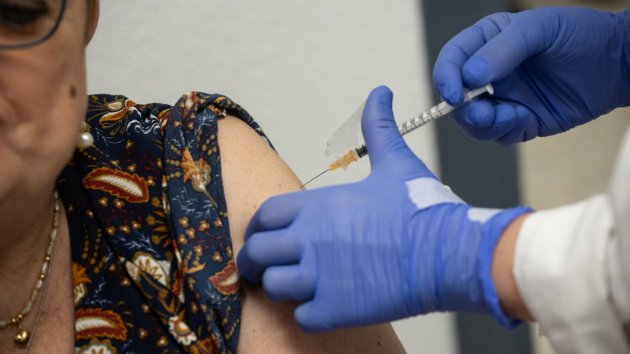CDC now encouraging doctors to consider more blood testing for “forever chemicals”
Written by ABC Audio ALL RIGHTS RESERVED on January 19, 2024
(ATLANTA) — Doctors are now being encouraged to consider more blood testing for PFAS, also known as “forever chemicals,” according to guidance released by the Centers for Disease Control and Prevention (CDC).
The federal agency is recommending providers have a discussion with their patients regarding consumer and environmental exposures to large levels of the chemicals, and if blood testing may be of benefit.
“This information is intended for individuals and communities around the country, who are concerned about exposure to PFAS to have productive conversations with their medical providers” Dr. Aaron Bernstein, Director of CDC’s National Center for Environmental Health (NCEH) and the Agency for Toxic Substances and Disease Registry (ATSDR), told ABC News.
“Over 90% of people in this country have been exposed to PFAS and many, many communities around the country…there have been very high exposures. And we’ve learned more and more in recent years about how exposures to PFAS may increase risk for many disease” he added.
Per-and polyfluoroalkyl substances, known as PFAS, are a group of chemicals used in consumer products including clothing, furniture, adhesives, food packaging, heat-resistant non-stick cooking surfaces, and electrical wire insulation, according to the CDC. They typically are used to resist heat, oil, stains, grease, and water.
Potential health effects associated with PFAS exposure include higher cholesterol, lower birth weight, kidney and testicular cancer, pregnancy-induced hypertension and preeclampsia, and elevated liver enzymes, according to the CDC.
The new guidance advises providers to consider an individual’s exposure history; the results of PFAS testing from a patient’s water supply, food sources, or other exposures; and whether those results can inform regarding ways to reduce future exposures.
Most Americans are exposed to PFAS through drinking water, according to Bernstein, who also notes that many municipal water agencies are already testing for PFAS, and those test results are typically publicly available.
People can reach out to their local water supply to learn about if and how they may be addressing PFAS, as well as ask them to test the water for PFAS, according to the U.S. Environmental Protection Agency. Those who use a personal well for drinking water should contact their state environmental or health agency for detailed advice on testing methods.
While blood tests for PFAS may help guide exposure reduction or provide psychological relief to patients, such tests do not help identify the source of exposure, nor can they be directly linked to a health condition. There are also currently no approved medical treatments available to reduce PFAS in the body, according to the CDC.
“A PFAS level is one piece of data that needs to be taken in a broader context. We need to understand the individual’s health history, their family history, what other exposures they may have that might increase the risk of diseases that can also be associated with PFAS,” Bernstein said.
Blood testing may also not be widely available across the country, with some laboratories offering tests that are covered by insurance and others potentially requiring out-of-pocket payments. The tests can be expensive, costing hundreds of dollars, and may not be able to test for all of the thousands of PFAS.
“What is clear is that this is an evolving landscape…we are at a point in time that both the science around PFAS, the accessibility of testing, and what is being tested for is changing,” Bernstein said.
“We are committed at CDC to stay on top of it and update this information as needed,” he added.
Copyright © 2024, ABC Audio. All rights reserved.






